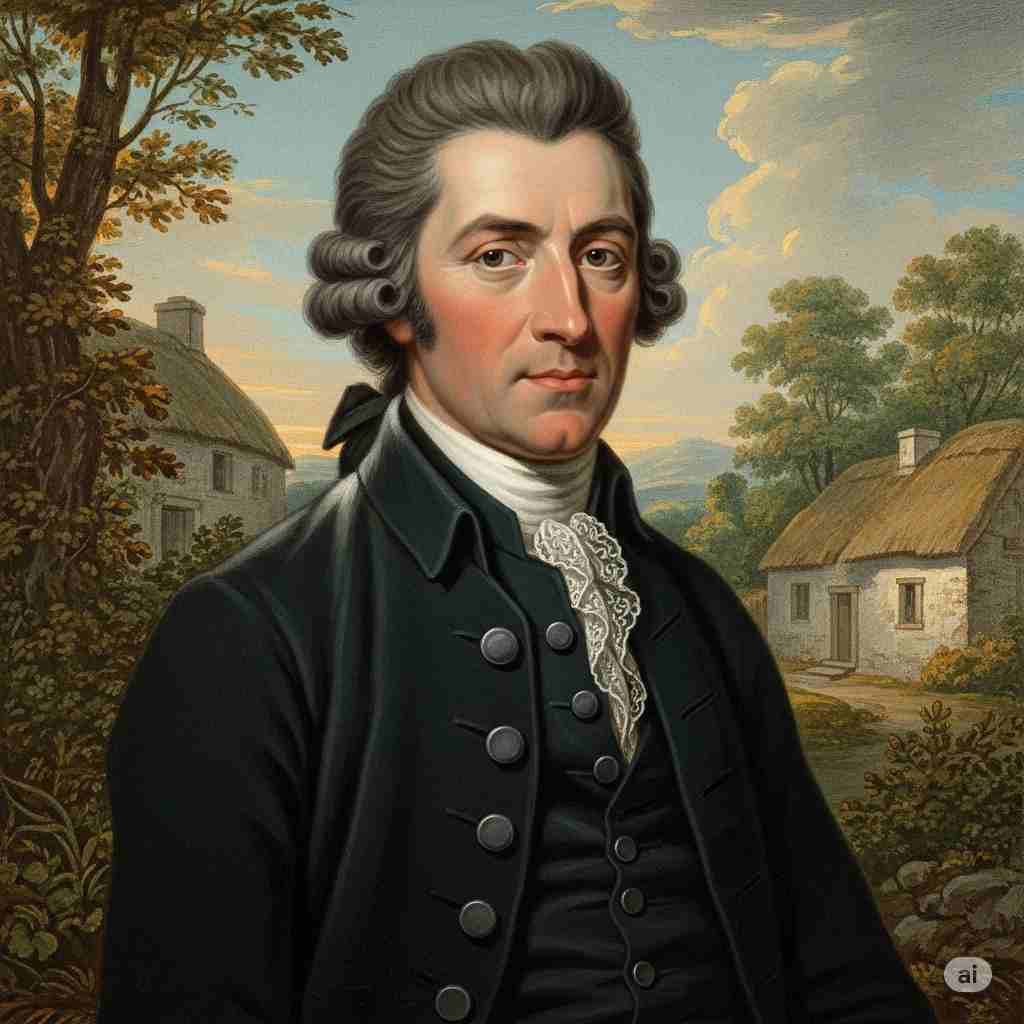2 Poems by Antoine Ó Raifteirí
1780 - 1835
Antoine Ó Raifteirí Biography
Antoine Ó Raifteirí, often Anglicized as Anthony Raftery, was an Irish poet who traversed the island in the late 18th and early 19th centuries, composing and reciting his works in the rich tradition of the Gaelic bard. Though his life was marked by hardship and poverty, his poetry has endured, ensuring his place as a significant figure in Irish literature and a poignant symbol of a fading era in Irish cultural history.
Born in Killedan, near Kiltimagh in County Mayo, around 1780, Ó Raifteirí's early life was marked by tragedy. While the exact details are uncertain, it's believed that he was one of nine children in a family headed by a weaver who had migrated from County Sligo. At the young age of six or seven, Ó Raifteirí contracted smallpox, a disease that tragically claimed the lives of his siblings and left him permanently blind. This devastating event irrevocably shaped his life's trajectory, setting him on the path to becoming a wandering poet.
Despite his blindness, Ó Raifteirí displayed a keen mind and a natural aptitude for language and music. It is believed that he received some rudimentary education, perhaps from a local hedge schoolmaster or a sympathetic member of the community. However, his blindness largely excluded him from the formal education system of the time. Instead, he immersed himself in the rich oral tradition of his community, absorbing the stories, songs, and poems that were the lifeblood of rural Irish society.
Ó Raifteirí's blindness, while a source of immense personal hardship, also became a catalyst for his poetic development. Unable to engage in the typical occupations of his rural community, he turned to poetry and music as a means of expression and livelihood. He learned to play the fiddle, a skill that would serve him well in his itinerant life, and began to compose his own verses, drawing inspiration from the world around him and the rich tapestry of Irish folklore and mythology.
In his late teens or early twenties, Ó Raifteirí embarked on the life of a wandering bard, a tradition that had existed in Ireland for centuries. With his fiddle in hand and his mind teeming with verses, he travelled throughout the west of Ireland, particularly in counties Mayo and Galway. He would frequent fairs, markets, and gatherings, reciting his poems and playing his fiddle for the assembled crowds. In return for his performances, he would receive food, lodging, and perhaps a small amount of money.
Ó Raifteirí's poetry was deeply rooted in the oral tradition. His verses were composed and transmitted orally, often set to traditional Irish airs. His poems were not written down during his lifetime; they were preserved in the memories of those who heard them and passed down through generations. This oral transmission gives his work a unique immediacy and vibrancy, capturing the rhythms and cadences of spoken Irish.
Thematically, Ó Raifteirí's poetry encompasses a wide range of subjects. He composed love poems, laments, political satires, and elegies. He sang of the beauty of the Irish landscape, the joys and sorrows of love, the plight of the poor and oppressed, and the lingering memories of a heroic past. His work is imbued with a deep sense of place, reflecting the social and political realities of rural Ireland in the early 19th century.
One of Ó Raifteirí's most celebrated poems is his lament for Mary Hynes, a woman from County Galway whom he immortalized in verse. "Eibhlín a Rún" (Eileen, my love) is a poignant expression of love and loss, capturing the essence of traditional Irish love poetry. The poem's enduring popularity is a testament to Ó Raifteirí's skill in weaving together personal emotion, traditional imagery, and the musicality of the Irish language.
Ó Raifteirí's poetry also provides a valuable window into the social and political upheavals of his time. He lived through a period of immense change in Ireland, marked by the 1798 Rebellion, the Act of Union in 1800, and the ongoing displacement of the rural poor. His poems often reflect these turbulent times, expressing the anxieties and frustrations of a people grappling with poverty, land dispossession, and political marginalization.
Despite his popularity as a poet and performer, Ó Raifteirí's life was one of constant struggle. He lived in poverty, relying on the generosity of others for his survival. His blindness made him vulnerable and dependent, and he was often at the mercy of those who were less than charitable. Yet, his spirit remained unbroken, and he continued to compose and recite his poetry until his death in 1835.
Ó Raifteirí's legacy is multifaceted. He is remembered as one of the last of the traditional Irish bards, a keeper of the flame of Gaelic culture in a time of rapid social and political change. His poetry, though composed orally, has been preserved and transcribed, ensuring its continued appreciation by scholars and enthusiasts of Irish literature. His work has been translated into English and other languages, introducing his unique voice to a wider audience.
In the realm of Irish cultural identity, Ó Raifteirí holds a special place. He embodies the resilience and creativity of the Irish people in the face of adversity. His poetry, rooted in the oral tradition and imbued with the spirit of place, speaks to the enduring power of language and culture to connect generations and preserve a sense of identity.
Ó Raifteirí's life and work have also been a source of inspiration for artists and writers. His story has been dramatized in plays and documentaries, and his poetry has been set to music by contemporary composers. His influence can be seen in the work of later Irish poets, who have drawn inspiration from his themes, his language, and his deep connection to the Irish landscape.
In the 21st century, Ó Raifteirí's poetry continues to resonate with readers and listeners. His verses, though composed in a different era, speak to universal human experiences of love, loss, and the struggle for survival. His work serves as a reminder of the power of poetry to transcend time and place, connecting us to the past and illuminating the present.
The preservation of Ó Raifteirí's poetry is largely due to the efforts of scholars and collectors who recognized the value of his work. In the late 19th and early 20th centuries, figures such as Douglas Hyde, Lady Gregory, and other key figures in the Irish Literary Revival took an interest in Ó Raifteirí's poetry, collecting and transcribing his verses from those who still remembered them. Their efforts ensured that Ó Raifteirí's work was not lost to posterity but was instead preserved as a vital part of Irish literary heritage.
Ó Raifteirí's poetry offers a unique perspective on the social and cultural landscape of early 19th century Ireland. His verses provide insights into the lives of ordinary people, their struggles, their joys, and their enduring connection to the land and its traditions. His work also reflects the tensions and contradictions of a society undergoing rapid transformation, caught between the pull of tradition and the forces of modernization.
In his love poems, Ó Raifteirí expresses the tenderness and passion of the human heart with a simplicity and directness that is both moving and timeless. His laments for departed loved ones capture the profound grief of loss and the enduring power of memory. His political satires, often laced with humor and irony, offer a critique of the social injustices and political corruption of his time.
Ó Raifteirí's poetry is also notable for its linguistic richness. He was a master of the Irish language, employing its nuances and rhythms to create verses that are both lyrical and evocative. His work is a testament to the beauty and expressiveness of the Irish language, even in a time when it was under increasing pressure from the dominance of English.
The study of Ó Raifteirí's poetry offers a rich and rewarding experience for scholars and students of Irish literature. His work provides a window into the social, cultural, and political realities of early 19th century Ireland, as seen through the eyes of a poet who was deeply connected to the land and its people. His poetry also offers insights into the oral tradition, the art of memorization, and the transmission of cultural knowledge through generations.
Ó Raifteirí's legacy extends beyond the realm of literature. He has become a symbol of cultural resilience and the enduring power of the human spirit to overcome adversity. His story has inspired generations of Irish people, reminding them of the richness of their cultural heritage and the importance of preserving their language and traditions.
In the 21st century, Ó Raifteirí's poetry continues to be celebrated and studied. His work has been the subject of numerous academic articles, books, and documentaries. His verses have been set to music by contemporary composers and performed by renowned musicians. His story has been dramatized in plays and films, bringing his life and work to new audiences.
The enduring appeal of Ó Raifteirí's poetry lies in its ability to connect us to the past while also speaking to the present. His verses, though composed in a different era, resonate with contemporary readers because they address universal human experiences of love, loss, joy, sorrow, and the struggle for survival. His work reminds us of the power of poetry to transcend time and place, offering solace, inspiration, and a deeper understanding of the human condition.
This text was generated by AI and is for reference only. Learn more
Username Information
No username is open
Everything is free to use, but donations are always appreciated.
Quick Links
© 2024-2025 R.I.Chalmers (V2Melody).

All music on this site by R.I.Chalmers (V2Melody) is licensed under a Creative Commons Attribution-NonCommercial 4.0 International License.
Attribution Requirement:
When using this music, you must give appropriate credit by including the following statement (or equivalent) wherever the music is used or credited:
"Music by R.I.Chalmers (V2Melody) – https://v2melody.com"
Support My Work:
If you enjoy this music and would like to support future creations, your thanks are always welcome but never required.
Thanks!



